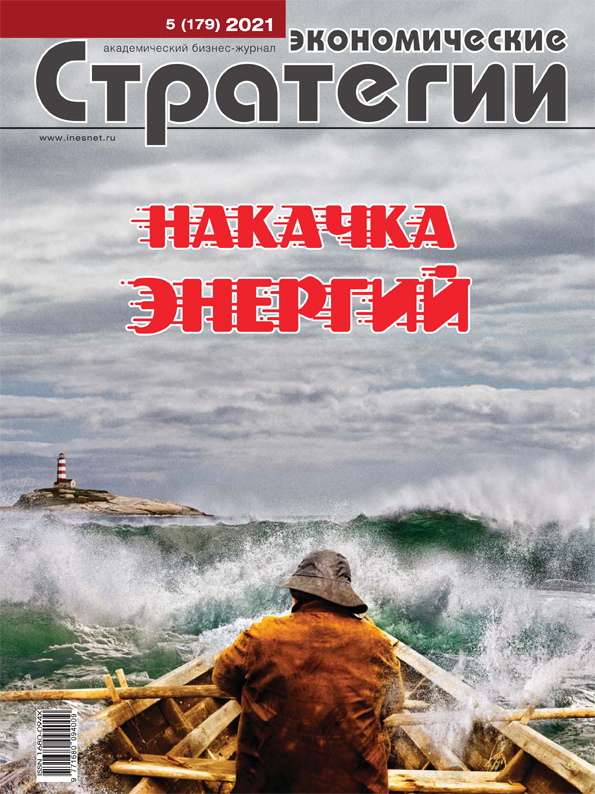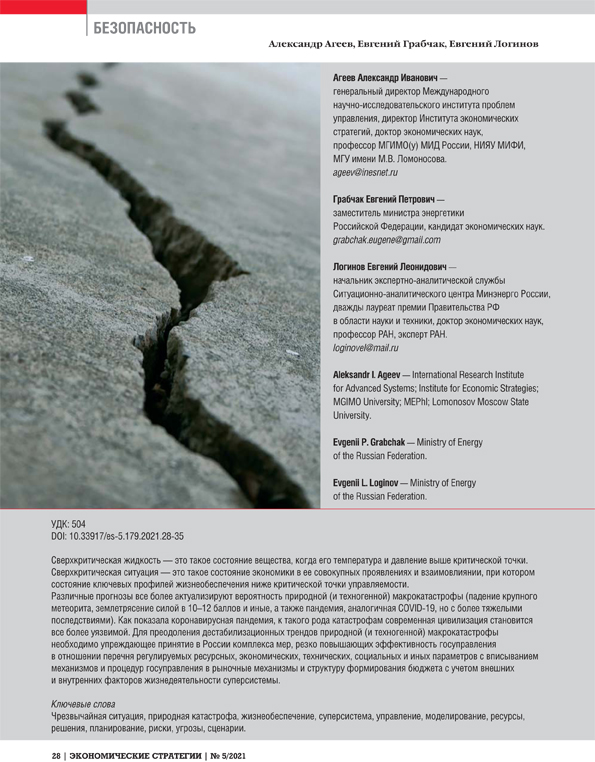Russia in Supercritical Situation: Managing Restoration of Life-Support Functions to Overcome the Consequences of a Natural Macro Catastrophe
DOI: https://doi.org/10.33917/es-5.179.2021.28-35
Supercritical fluid is a state of matter when its temperature and pressure are above the critical point. Supercritical situation is a state of the economy in its cumulative manifestations and mutual influence, whereby the state of key life-support profiles is below the critical point of controllability. Various forecasts are increasingly actualizing the probability of a natural (and man-made) macro-catastrophe (a large meteorite fall, an earthquake of 10–12 points and others, as well as a pandemic similar to COVID–19, but with more severe consequences). As the coronavirus pandemic has shown, modern civilization is becoming ever more vulnerable to such disasters. To overcome the destabilizing trends of a natural (and man-made) macro-catastrophe, it is necessary to adopt proactively a set of measures in Russia that will drastically increase the efficiency of public administration in relation to the list of regulated resource, economic, technical, social and other parameters incorporating mechanisms and procedures of public administration into market mechanisms and the budgeting structure with regard to external and internal factors of the supersystem’s vital activities
References:
1. Ageev A.I., Loginov E.L. Coronavirus superstrategy: mirovaya proektsiya finansovoi modeli catastrophe just-in-time dlya vykhoda iz krizisa na novuyu geoekonomicheskuyu normal’nost’ [Coronavirus Superstrategy: Global Projection of the “Just-in-time Catastrophe’s” Financial Model for Overcoming the Crisis and Entering into a New Geo-Economic Normality]. Ekonomicheskie strategii, 2020, no 4, pp. 6–19, DOI: 10.33917/es-4.170.2020.6-19
2. Ageev A.I., Loginov E.L. Rossiya v novoi ekonomicheskoi real’nosti [Russia in a New Economic Reality]. Moscow, Institut ekonomicheskikh strategii, Assotsiatsiya “Analitika”, 2016, 460 p.
3. Grabchak E.P., Loginov E.L. Aktualizatsiya elementov tsentralizovannogo gosudarstvennogo upravleniya v rynochnoi srede TEK Rossii v usloviyakh mnogofaktornoi nestabil’nosti s rasshirennoi komponentoi neopredelennosti [Updating the Elements of Centralized Public Administration in the Market Environment of the Russian Fuel and Energy Complex in the Context of Multifactor Instability with an Extended Uncertainty Component]. Iskusstvennye obshchestva, 2020, no 2, p. 7.
4. Makarov V.L., Bakhtizin A.R., Sushko E.D. Tekhnologiya podderzhki agent-orientirovannogo modelirovaniya dlya superkomp’yuterov [Support Technology of Agent-based Simulation for Dupercomputers]. Natsional’nye interesy: prioritety i bezopasnost’, 2016, no 1, pp. 4–16.
5. Makarov V.L., Bakhtizin A.R., Sushko E.D., Ageeva A.F. Agent-orientirovannaya model’ Evrazii i imitatsiya realizatsii krupnykh infrastrukturnykh proektov [Agentbased Model of Eurasia and Imitation of Implementing Large-scale Infrastructure Projects]. Ekonomika regiona, 2018, no 4, pp. 1102–1116.
6. Makarov V.L., Bakhtizin A.R., Sushko E.D., Ageeva A.F. Imitatsiya sotsial’no-ekonomicheskoi sistemy evraziiskogo kontinenta s pomoshch’yu agentorientirovannykh modelei [Imitation of Socio-economic System of the Eurasian Continent Through Agent-based Models]. Prikladnaya ekonometrika, 2017, no 4, pp. 122–139.
7. Grabchak E.P., Loginov E.L. Analiz i prognozirovanie kriticheskikh situatsii v elektro- i teploenergetike Rossii na osnove vnedreniya innovatsionnykh informatsionnykh servisov [Analysis and Forecasting of Critical Situations in the Electric and Heat Power Industry of Russia Based on Introducing Innovative Information Services]. Innovatsionnaya deyatel’nost’, 2019, no 4, pp. 24–28.
8. Grabchak E.P., Grigor’ev V.V., Loginov E.L., Raikov A.N., Shkuta A.A. Upravlenie ekonomikoi Rossii v usloviyakh s predel’no bol’shoi komponentoi neopredelennosti razvitiya chrezvychainykh situatsii i kriticheskogo nedostatka informatsii [Russian Economy Management in Conditions with an Extremely Large Uncertainty Component in Development of Emergency Situations and Critical Lack of Information]. Problemy bezopasnosti i chrezvychainykh situatsii, 2019, no 4, pp. 104–110.
9. Bakhtizin A.R., Abramov V.I. Primenenie agent-orientirovannogo podkhoda dlya modelirovaniya stsenariev chrezvychainykh situatsii v regionakh Rossii. Ekonomicheskie i ekologicheskie vyzovy ustoichivomu razvitiyu Rossii i drugikh stran SNG: problemy formirovaniya novoi tekhnologicheskoi bazy: Materialy mezhdunarodnoi nauchno-prakticheskoi konferentsii [Applying an Agent-based Approach for Modeling Emergency Scenarios in the Regions of Russia: Economic and Environmental Challenges to Sustainable Development of Russia and Other CIS Countries: Problems of a New Technological Base Formation: Proceedings of the International Scientific-Practical Conference]. Moscow, IPR RAN, 2017, pp. 29–31.
10. Ageev A.I., Radina V.A. Metodologiya formirovaniya plana na osnove instrumentariya tsifrovoi ekonomiki [Methodology of Plan Development Based on Digital Economy Tools]. Ekonomicheskie strategii, 2019, no 4, pp. 6–17, DOI: 10.33917/es-4.162.2019.6-17.
11. Ageev A.I., Bochkarev O.I., Grabchak E.P., Loginov E.L. Setetsentricheskaya sistema povyshennoi zhivuchesti upravleniya energetikoi Rossii v slozhnoprognoziruemykh kriticheskikh usloviyakh [Net-Centric System of Elevated Survivability of Energy Management in Russia Under Difficult-to-predict Critical Conditions]. Ekonomicheskie strategii, 2021, no 3, pp. 6–17, DOI: https://doi.org/10.33917/es-3.177.2021.6-17.
12. Ageev A.I., Grabchak E.P., Loginov E.L., Makhutov N.A. Podkhody k vosstanovleniyu elementov gosudarstvennogo upravleniya v energetike dlya deistvii v usloviyakh chrezvychainykh situatsii slozhnoprognoziruemogo kharaktera [Approaches to Restoration of Public Administration Elements in the Energy Sector for Operating in Emergency Situations of a Difficult-to-predict Nature]. Problemy bezopasnosti I chrezvychainykh situatsii, 2020, no 4, pp. 53–59.
13. Bakhtizin A.R., Makarov V.L., Sushko E.D., Sushko G.B. Sistema proektirovaniya masshtabiruemykh agent-orientirovannykh modelei, vklyuchayushchikh populyatsii agentov raznykh tipov s dinamicheski izmenyayushcheisya chislennost’yu i slozhnymi mnogoetapnymi vzaimodeistviyami agentov, obrazuyushchikh sotsial’nye seti [System for Projecting Scalable Agent-based Models, Including Populations of Different Types of Agents with Dynamically Changing Numbers and Complex Multi-stage Interactions of Agents that Form Social Networks]. Svidetel’stvo o registratsii programmy dlya EVM RU 2020612410, 20.02.2020. Zayavka ot 6 fevralya 2020 g. N 2020611366.
14. Loginov E.L., Bortalevich S.I., Shkuta A.A., Loginova V.E. Podkhody k ispol’zovaniyu modeli samoorganizatsii i raspada neironno-setevykh struktur dlya povysheniya zhivuchesti informatsionnykh sistem organov gosudarstvennogo upravleniya vsledstvie prirodnykh, tekhnogennykh katastrof ili voennykh atak [Approaches to Applying the Model of Self-organization and Disintegration of Neural-network Structures for Increasing Survivability of Information Systems of the State Administration Bodies Owing to Natural, Man-made Disasters or Military Attacks]. Vestnik Moskovskogo universiteta MVD Rossii, 2017, no 4, pp. 187–194.
15. Bakhtizin A.R., Makarov V.L., Khabriev B.R. Opyt realizatsii parallel’noi prostranstvenno-raspredelennoi agent-orientirovannoi modeli s ispol’zovaniem mnogoyadernoi arkhitektury [Experience in Implementing a Parallel Spatially Distributed Agent-based Model Based on a Multicore Architecture]. Iskusstvennye obshchestva, 2020, no 1, pp. 2.
16. Grabchak E.P., Loginov E.L., Grigoriev V.V. Ensuring observability and controllability of complex technical systems in difficult and irregular situations when commands with a large distortion component are received. Lecture Notes in Electrical Engineering, 2021, vol. 729 LNEE, pp. 624–631.



